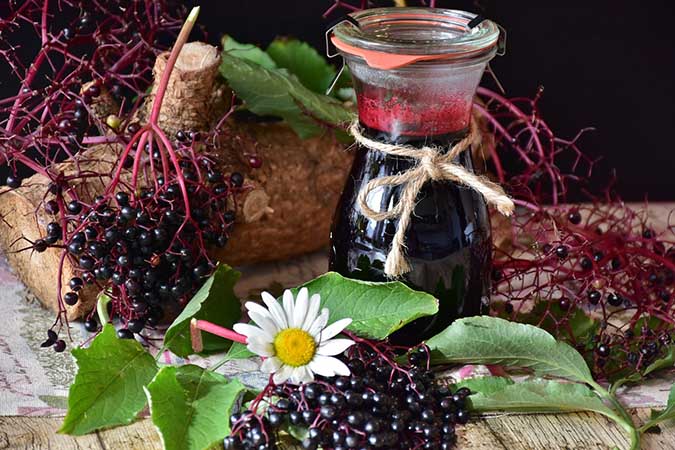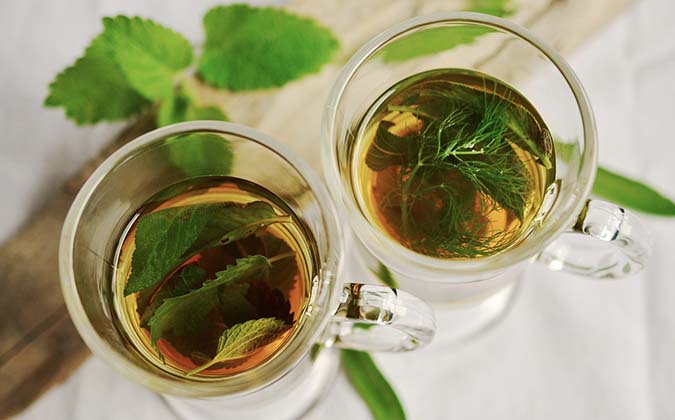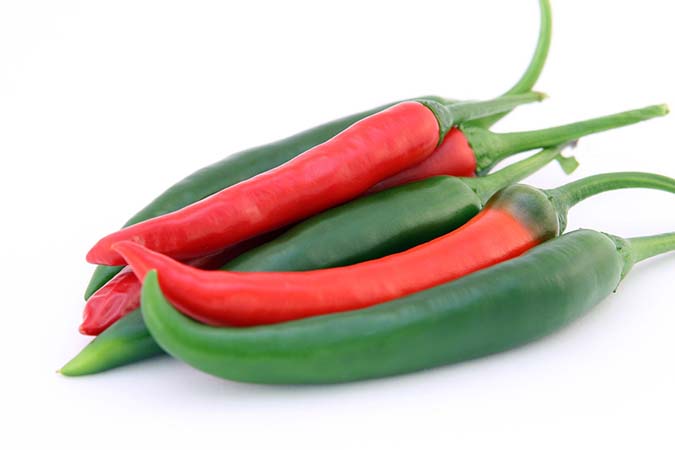Inside Edition, March 2018: “Top 10 Immune-Boosting Herbs”
March 2018
Top 10 Immune-Boosting Herbs
The 2018 flu season has been one for the record books, and we aren’t out of the woods with it yet. If you’re like most people, your immune system took a severe beating these past few months, and the time has come for you to give it some help.
The good news? Treating your immune system with plant-based remedies will help you fend off illness and even save you money. Herbal medicine is an ancient healing art that still has incredible relevance today. More than 40 percent of Americans currently rely on some form of plant-based medicine,1)The growing use of herbal medicines: issues relating to adverse reactions and challenges in monitoring safety and you can benefit from these herbal remedies, as well.
In fact, most modern medicine owes its potency to the active plant compounds within it, so why not go back to the primary source for your health?
How Plants Help the Immune System
When it’s at peak performance, your immune system is an incredibly fine-tuned machine. Exposure to potentially harmful pathogens is all it takes to kick it into high gear to create a defense of specialized cells, tissues, proteins, and organs to keep the invaders in check so that they can’t take over.
Certain plant compounds work to support your immune function over the long run. Some herbs have compounds that naturally inhibit viruses from establishing themselves in your body. For instance, adding garlic to your meals provides your system with formidable molecules like allicin and ajoene that work to both prevent and fight off infections; using garlic topically works as a wound disinfectant and helps fight fungal infections.
Garlic isn’t the only plant that can work wonders for your immune system. The following herbs deserve a space in your garden (or at least your medicine cabinet) because they can make a significant difference in how well your immune system functions.
Best Plants for Boosting the Immune System
Which herbs will give you the best immune-boosting benefits? While that depends on your personal physiology, these plants are a stellar place to start.

Elderberry (Sambucus nigra)
Used for centuries to treat colds and the flu,2)Elderberry Supplementation Reduces Cold Duration and Symptoms in Air-Travellers: A Randomized, Double-Blind Placebo-Controlled Clinical Trial elderberry is found today throughout Europe, Asia, and North America. Both the dark-hued berries and the flowers themselves can be made into a syrup or dried as a food additive, and the plant is renowned for its high levels of vitamins A, B, and C, as well as of flavonoids, which are anti-inflammatory compounds that promote healthy cellular functioning.3)The effect of Sambucol, a black elderberry-based, natural product, on the production of human cytokines: I. Inflammatory cytokines. Studies show that taking elderberry syrup can reduce your flu symptoms within 24 hours and reduce your overall recovery time by three days.4)University of Maryland Medical Center: Elderberry
Best of all, elderberry is easy and delicious to add to your daily life. Drizzle a spoonful over your oatmeal or add a dollop to your sparkling water and your body will appreciate the boost to its immunity. If you feel yourself getting sick, taking a serving of elderberry within 24 hours may help ease your symptoms.
Thyme (Thymus vulgaris)
Native to the Mediterranean, you can consider yourself lucky that thyme grows well in a variety of climates, because it makes for an impressive cough remedy. Thanks to its volatile oils, thyme works as a detoxifying and penetrative agent to open up your pores and thin out mucus so you don’t stay congested. Drinking a cup of thyme leaf tea when you feel ill will help you expel phlegm and soothe inflamed tissue in your lungs.5)Efficacy and tolerability of a fluid extract combination of thyme herb and ivy leaves and matched placebo in adults suffering from acute bronchitis with productive cough
Peppermint (Mentha piperita)
This common digestive aid seems to have benefits for your immune system, too. Peppermint leaves are an excellent natural source of B vitamins and vitamin C, calcium, and potassium, and it has long been used as a natural fever remedy. Research on broiler chicks found that peppermint powder improved their immunity under stress conditions,6)Effect of Peppermint (Mentha piperita) Powder on Immune Response of Broiler Chickens in Heat Stress and the herb’s ability to fend off microbes, soothe the digestive system, and clear the nasal passageways by breaking up phlegm makes it ideal for recovering from the flu.7)University of Maryland Medical Center: Peppermint
Astragalus (Astragalus membranaceus)
As a longtime staple of Traditional Chinese Medicine, astragalus can help to strengthen your body against disease. Considered to be an adaptogen, this herb is backed by evidence that its antioxidants and other beneficial compounds can protect you against cancer and diabetes. There is also evidence that astragalus can boost immune systems that are weakened by chemotherapy or radiation,8)Memorial Sloan Kettering Cancer Center: Astragalus and that it might improve the quality of life for HIV/AIDS patients (though these results are mixed).9)University of Maryland Medical Center: Astragalus
Hot Peppers (Any Variety)
Cultures around the world regularly incorporate spicy foods into their diets, and for good reason. Capsaicin, the pungent component of hot peppers, has been found to be useful for treating infections by boosting the immune system, and they are also found to have potent antifungal, antiparasitic, and antibacterial properties.10)Modulation of select immune responses by dietary capsaicin. So dish some onto your plate when you’re starting to feel sick, and your body will appreciate the help.
Echinacea (Echinacea purpurea)
Echinacea, especially when paired with goldenseal, is one of the best-known herbs for protecting the immune system. The evidence shows that the potent phytochemicals in this pretty flower can reduce viral infection and cancerous tumors (at least in mice).11)Echinacea: a Miracle Herb against Aging and Cancer? Evidence In vivo in Mice
The plant contains a beneficial compound called echinacein that prevents bacteria and viruses from getting into healthy cells, which significantly reduces your chance of contracting an infection. Reviews of echinacea’s overall effectiveness are mixed, but some results show that taking it orally can stimulate functioning in your immune cells and speed up your recovery from the common cold.12)University of Maryland Medical Center: Echinacea
Because results seem to indicate that echinacea isn’t as effective as a preventative measure, you’re likely best off taking it only when you feel the flu coming on.
Green Chiretta (Andrographis paniculate)
Though you likely haven’t heard of it before, green chiretta is a common herb in India and Sri Lanka that has well-studied benefits for the immune system. Studies show that it works both to reduce your risk of developing a cold and to help you recover faster.13)Experimental and Clinical Pharmacology of Andrographis paniculata and Its Major Bioactive Phytoconstituent Andrographolide The evidence shows that the plant works to promote the ability of a variety of immune cells to fight off foreign invaders before they can establish themselves.
Cat’s Claw (Uncaria tomentosa)
Don’t let this herb’s cutesy name confuse you; it’s actually a powerful form of natural medicine that has been found to help lower blood pressure, reduce bloating and water weight, and even kill tumor cells.14)University of Maryland Medical Center: Cat’s Claw This woody South American plant has long been used to treat arthritis and inflammation, and to improve immune system function. In fact, it’s antiviral properties make it useful as a natural cure for herpes, and possibly even HIV.
To get the benefits for yourself, brew up a cup of herbal tea and add a tablespoon of the ground herb to the water.
Ginseng (Panax quinquefolius)
Renowned throughout Asia as a way to increase your energy levels and improve concentration and memory, this Chinese medicine staple ingredient is also prized for healing bronchitis and helping your body fight off inflammatory disorders. Thanks to ginsenosides (ginseng’s active compounds), the herb helps your body fight fatigue and boosts the immune system, mainly by helping it maintain homeostasis to fend off microbial attacks.15)Ginseng, the ‘Immunity Boost’: The Effects of Panax ginseng on Immune System
Licorice Root (Glycyrrhiza glabra)
It might surprise you that an herb most famous for the candy it creates can also work to keep your immune system healthy. Licorice contains glycyrrhizin, a compound known for being 50 times sweeter than sugar, which shows promise for treating and preventing diseases like hepatitis C, the flu, and HIV.16)Anti-virus research of triterpenoids in licorice Licorice root also has an impressive arsenal of antioxidants that can keep you healthy by naturally cleansing the colon, relieving heartburn, lowering cholesterol, and improving your immune system.17)Free radical-scavenging, antioxidant and immunostimulating effects of a licorice infusion
How to Incorporate Immunity-Boosting Plants Into Your Routine
Understanding that herbs can help you fight off the flu and knowing how to put them to work are two entirely different things. Oftentimes, merely munching on the leaves themselves will lead to a bitter-tasting (and potentially dangerous) experience, so it’s important to know the optimal ways to put them to use.
Below are some suggestions for getting started.

Brew Herbal Tea
Infusing herbs in water is a great way to extract their compounds for your health, and different plants can provide you with significantly different benefits. Because teas are a relatively mild way to take medicinal herbs, they are often the best starting point for those beginning to experiment with herbal medicine.
Indulge in an Herbal Infusion
Because they require a larger quantity of plant material, herbal infusions are significantly stronger than herbal teas. You can make your own by steeping a cup of antiviral herbs in hot water for at least seven hours. Afterward, you can strain out the plant material and store the resulting infusion in an airtight jar. Due to their potency, it’s best not to drink more than a cup of an infusion per day.
Take Advantage of a Four Thieves Tonic (Fire Cider)
This spicy brew is a folk medicine remedy designed to keep your immune system in peak form during the chilliest months of the year, but it’s also an excellent wellness tonic to sip on all year long.
If you’ve never made your own before, this recipe from Marjory takes advantage of the potent immune-boosting properties of hot peppers by incorporating them with garlic, juniper berries, horseradish, rosemary, and other ingredients.
Make a DIY Herb-Infused Oil
You don’t need to ingest herbs to experience their ability to support your immune system; using them topically is often just as effective. Make your own herb-infused oil by heating your plant of choice in a carrier oil (coconut or jojoba oil both work well) for several hours to infuse them together. An oven on low heat will work, as does leaving the herbs in a clear jar out in a sunny spot for at least 12 hours.
After the herbs are infused into the oil, drain them out and store the oil as a topical solution for alleviating infections and reducing pain.
Self-Medicate With Essential Oils
Don’t want to mess with the plants themselves, but would rather benefit from just their most robust compounds? Then essential oils are the way to go. Mixing two to three drops of high-quality oils into bathwater can restore your immune system when you’re not feeling your best, as can mixing a few drops into a carrier oil before rubbing it into your skin. Massaging the mix into your hands, feet, or chest can work wonders for helping your body fight off a fever or a cold.
Steam Up Your Sinuses
If your respiratory system is taking a hit from your hacking cough, herbal steam might be precisely what you need to clear things up. Simply bring four to six cups of water to a boil and add a few drops of essential oil once you take it off the heat. Next, lean over the bowl and drape a towel over your head to form a tent so that you can breathe in the fumes deeply. You should begin to feel your airways clearing after just 5 to 10 minutes.
Remember: Fresh Herbs are the Best Herbs
If you want to take your health back from pharmaceutical companies and bring it back to your own hands, one of the best things that you can do is to grow and make your own herbal remedies. It’s cheaper and easier than you think to start your own medicinal herb garden, and you’ll gain the power of filling your body with exactly what it needs to function as it should.
The Grow Network is filled with resources for getting started with your own herbal garden, so make today the day you make a change to benefit your health. Your immune system will thank you.
References
